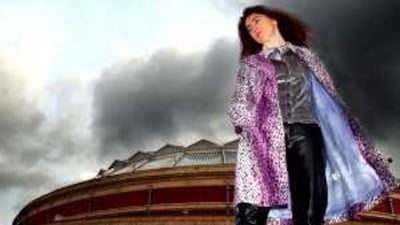If you have been sated on a diet world-class international orchestras, conductors and vocalists performing epoch-defining works by some of the greatest classical composers of the western world (I refer to Abu Dhabi Classics, which is taking its final breaths of the 2010 season this week), then it may be time to turn your attention to Sounds of Arabia. Now in its third year, the nine-day event, which started on Thursday and runs throughout this week until Saturday, presents a gloriously compact view of the Middle Eastern classical sound.
Its line-up of 14 artists from the region consists largely of emerging talent, but the week is also punctuated with performances by several of the Arab world's best-known musicians. Of the frenetic programme, several stand out: Wednesday sees the Syrian singer Sabah Fakhri, a modern-day champion of Tarab, take to the stage. On Thursday, the US-based MESTO (Multi-Ethnic Star Orchestra) will perform highlights from the 20th century Arabic classical repertoire, accompanied by the great Moroccan chanteuse, Karima Skalli.
And to sing us out, we have the fascinating-sounding Iranian Evening on Saturday, which will feature a group of young Iranian musicians accompanying words by the great 14th century poet Hafez with classical Persian "dastgah" music. The second part of the programme will see the percussionists Zarbang performing rhythmic sounds from Persian musical heritage, as well as the surrounding areas. It wouldn't be a music festival, though, without a series of talks and film screenings to accompany the performances.
Worth marking your diaries for is a screening on Wednesday evening of the film Sufi Soul: The Mystic Music of Islam, by Simon Broughton, in which the music journalist explores the various musical traditions at the heart of Sufism, and it shared roots in Islam and Christianity. And so to those last breaths of the classical music festival that has been doling out almost weekly music fixes since October last year, when it opened with the stellar New York Philharmonic and their performances of Beethoven's Piano Concerto No 4 and Mahler's Titan Symphony No 1.
The final two performances feature an evening with Evelyn Glennie, one of the world's great percussionists, and the Best of British Gala, a night of rousing classics in the style of "Last Night of the Proms". Dame Evelyn Glennie is the Scottish percussionist who has had more than 100 works written for her and won countless awards. Much has been made of her role as the "world's first full-time solo percussionist".
Surely more interesting, though, is the fact that she owns around 1,800 percussion instruments. Catch her performance on Friday night. And then, of course, the flag-waving extravanganza that is the Best of British Gala is on Saturday night. All that shouting and waving may seem, to non-Brits, rather at odds with classical music's refined reputation; so this is likely to be a slightly more subdued affair than its Royal Albert Hall counterpart in London, where a rowdy crowd sing along to British classics including Elgar's Pomp and Circumstance March (Land of Hope and Glory) and Rule, Britannia. Expect a stirring evening, nonetheless.
This week also sees a nice little trio of exhibitions opening at XVA gallery in Dubai, featuring works by the Dubai-based American artist Julia Townsend, as well as two newcomers, the Turkish-American conceptual artist Suzanne Kanatsiz and the abstract Sri Lankan artist Anoma Wijewardene.

